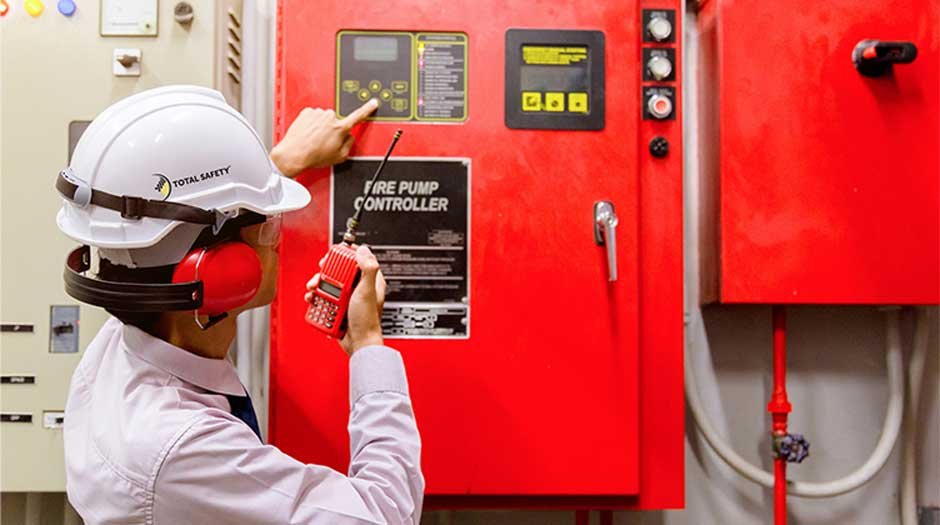Did you know that a structure catches on fire every 63 seconds in the U.S.? Many of those fires affect office properties and other businesses, like hotels, theaters, nightclubs, and hospitals. That’s why businesses must undergo regular fire inspections.
Fire inspections are intended to keep safety equipment in good working order and ensure that the people in a building have a safe means of egress should a fire break out. Some businesses only need a fire inspection once a year, while others require more frequent inspections. Sometimes, local fire inspectors may even perform surprise inspections on a business – they want to make sure the business is putting fire safety first every day, not just on days when the people in charge know there’s a fire inspector coming.
What do fire inspections cover? How often do they happen? How can you prepare? Here’s what to expect from a fire inspection.
Fire Inspections Can Vary in Frequency
How often are fire inspections performed? That really depends on what kind of business you’re running. The majority of office buildings, factories, and other businesses are only going to get fire inspections once a year. However, there are some kinds of buildings and businesses that get inspected more often.
For example, businesses that are considered places of public assembly get more frequent fire inspections. Hotels, hospitals, nightclubs, and theaters are in this category. Some of the deadliest first in U.S. history occurred in theaters, clubs, hospitals, and hotels. High-rise buildings also require more frequent fire inspections, as they tend to be high occupancy and it can be complicated for people on the higher floors to get out in case of a fire.

Surprise Fire Inspections Are Possible
Some fire inspections are scheduled, but you shouldn’t count on knowing in advance when the fire inspector will be coming. Drop-in inspections are common, and they allow fire inspectors to make sure you’re not just sprucing up the place for the inspection and then letting fire safety standards lapse the rest of the time. Keep your company compliant with your local fire codes all the time. That way you’ll pass any drop-in inspections you’re subject to, but more importantly, you’ll be less likely to lose anyone if a fire does break out.
Know What Fire Inspectors Look For
Fire codes can vary from one jurisdiction to the next, so it’s a good idea to look up your local fire codes and call the fire station with any questions you have. However, for the most part, fire inspectors are going to be looking for the same things in every jurisdiction.
They’re going to be looking around the building for possible places where fire could break out – such as around improperly stored, combustible chemicals, for example. They’ll be checking that the building’s safety systems are in good working order and are being properly maintained – that includes sprinklers, smoke alarms, and fire extinguishers. They’re going to check that you have the right kinds of fire extinguishers for the type of fire that’s most likely to happen in your facility. They’re going to check that your fire extinguishers aren’t expired.
They’re also going to be looking at your building’s egress system – the means people have of escaping a fire. They’ll be verifying that your lighted exit signs are working and that your exit doors are unlocked (or easy for a person to open without a key), that hallways and doorways are clear, and that emergency personnel will be able to easily gain access to the building. Most fire inspectors these days are going to use a digital fire inspection software tool to write and file your inspection report.
Prepare for a Fire Inspection
Once you know what to expect from a fire inspection, you can prepare. Keep safety systems like smoke alarms and sprinkler systems well maintained and working properly. Remove obstacles and obstructions from exit stairways, hallways, and doorways. Make sure everyone has a means of getting out of the building through an unlocked door. The building address should be prominently displayed on the outside of the building, and the front door should be clear of any obstructions and unlocked, so that emergency personnel can locate the building and get in.
In addition to keeping your safety systems and fire extinguishers in working order, you should be ready to provide proof that these systems are being maintained in the form of documentation. You’ll also need to provide copies of previous inspection reports. Make sure combustible or flammable materials are stored properly. Avoid using extension cords as permanent wiring solutions. Use power strips with computers, and ensure your electrical system is well maintained.
It’s a good idea to keep your company ready to undergo a fire inspection at any time. Fire inspectors are there to protect us from fire hazards – the recommendations they make really do save lives.






